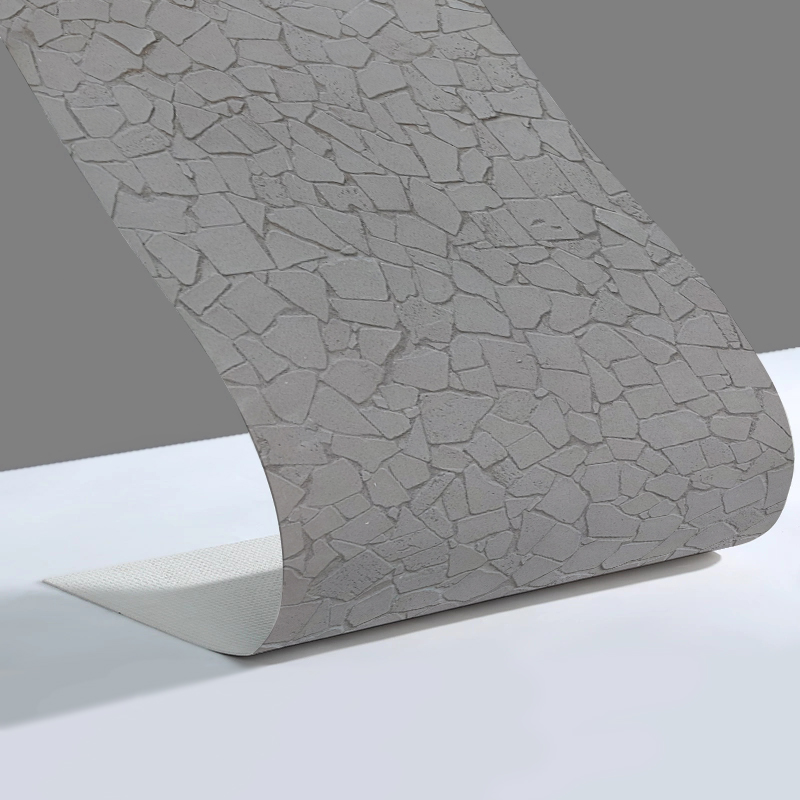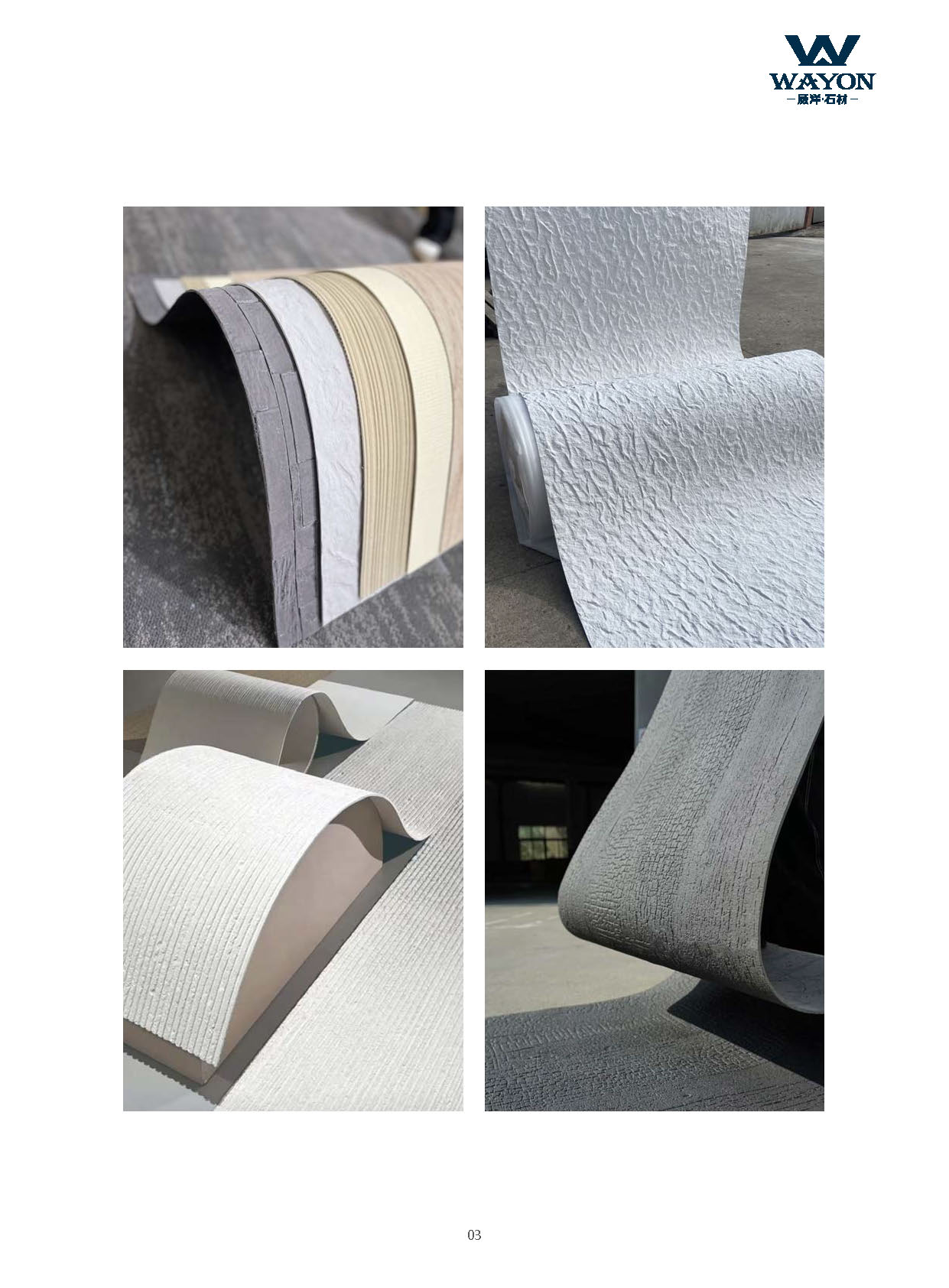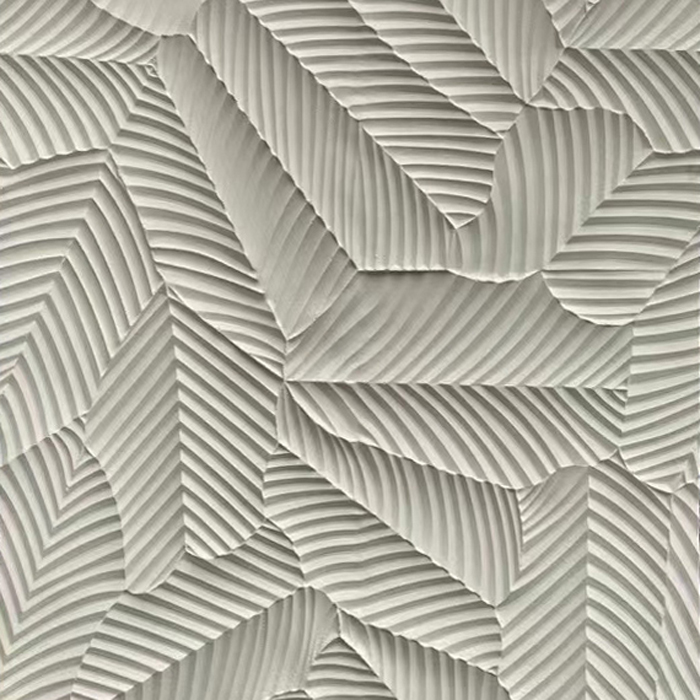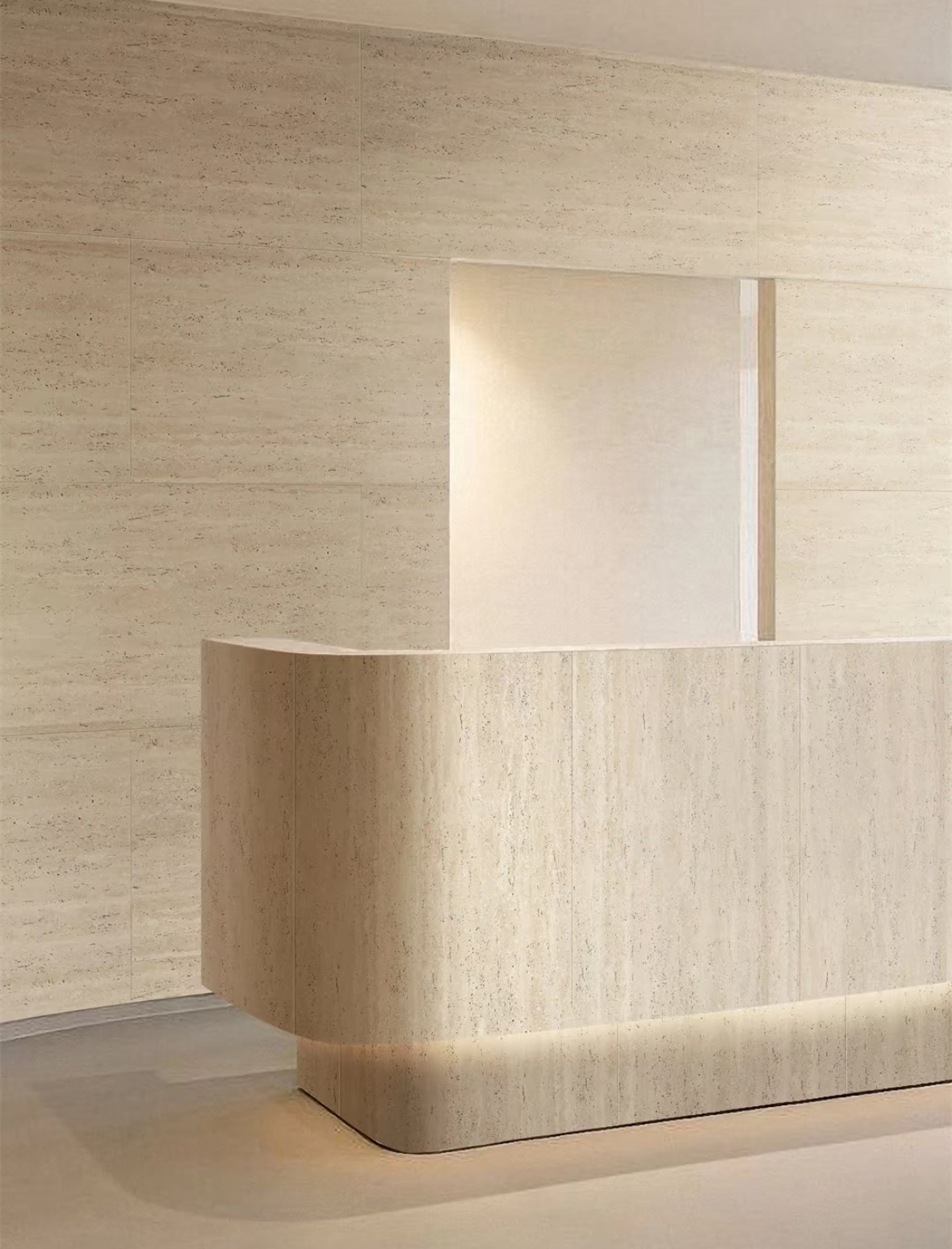PU Stone vs Flexible Stone: Which is Better For Modern Decorative Wall Cladding
When it comes to modern wall cladding, many architects and designers face the same question: Should we choose PU stone or flexible stone?
At first glance, both seem lightweight, versatile, and decorative. But once you dive into project scale, longevity, and safety standards, the differences become clear. To illustrate this, let’s take WAYON MCM Flexible Stone (ultra-thin soft stone) as an example and explore how it performs compared to PU stone in real applications.
1. The Basics: Understanding PU Stone and Flexible Stone
PU Stone: Lightweight and Convenient for Small Interiors
PU Stone, short for polyurethane stone, is made by combining polyurethane resin with lightweight fillers and applying an imitation stone surface finish. Its biggest advantage is speed and simplicity. For small interior projects, such as feature walls in cafes, temporary retail spaces, or apartment renovations, PU stone helps save time and cost, making it ideal for projects with limited budgets or tight timelines.
Key characteristics:
- Lightweight, reducing wall load with no need for extra support.
- Quick installation, small areas (under 10m²) can be completed within days.
- Budget-friendly and easy to replace, ideal for short-term use or when decor style may change frequently.
However, its convenience has trade-offs. PU stone is less resistant to heat, UV rays, and moisture, meaning it’s best suited for dry indoor environments with stable temperatures.
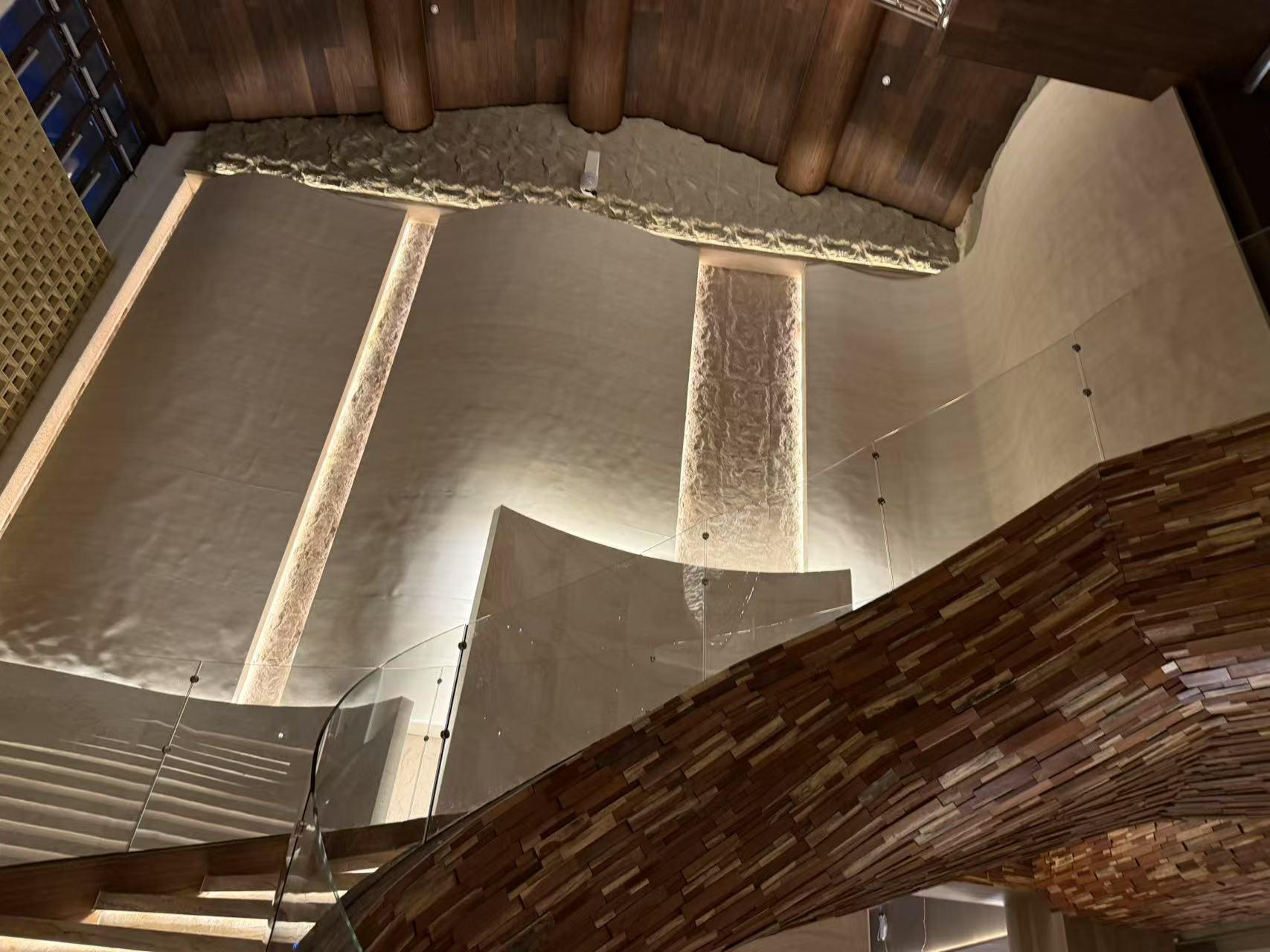
Modern MCM Soft Wall Covering
MCM Flexible Stone: Flexible, Durable, and Environmentally Advanced
MCM stone (Mineral Composite Material Stone), often known as ultra-thin soft stone, represents the next generation of decorative materials. Using inorganic components like sand, stone powder, and tailings, it’s manufactured through specialized processes that give it flexibility and excellent physical strength.
MCM flexible stone cladding combines the natural texture of stone with the adaptability of modern composites, making it suitable for almost every decorative application—indoors or outdoors.
Advantages at a glance:
- Eco-friendly: made from inorganic materials, free from harmful emissions.
- Flexible: can wrap around curved or irregular surfaces.
- Durable: resistant to corrosion, weather, and aging.
- Efficient: lightweight, easy to transport, and less prone to breakage during installation.
From apartment walls to large-scale hotel facades, MCM soft stone wall panels deliver both practicality and beauty, setting a new standard for stone materials for decoration.
Natural Stone Look MCM Cladding
2. PU Stone vs MCM Flexible Stone: A Comprehensive Material Comparison
To make the right decision, let’s look beyond the surface and compare both materials across essential dimensions for modern decorative projects.
1) Weather Resistance
PU stone performs well indoors or for temporary displays, but under continuous sunlight, humidity, temperature fluctuations, or long-term outdoor exposure, its surface coating and foam core tend to deteriorate.
MCM flexible stone, on the other hand, is engineered for all-weather performance. It resists UV radiation, heavy rain, and extreme temperature changes without fading or cracking. That’s why it’s commonly used for residential exterior walls, hotel entrances, municipal landscape walls, and so on.
For projects exposed to the elements, MCM flexible stone ensures long-term color stability and structural integrity, while PU stone remains limited to short-term interior use.
2) Fire Performance
Safety standards are increasingly strict, especially in public or high-rise buildings.
PU stone has a B-grade fire rating, meaning it’s hardly flammable—it can resist ignition to some extent but is not completely non-combustible. It’s acceptable for basic indoor applications like residential and small office walls.
MCM flexible stone achieves an A-grade fire performance—it’s completely non-combustible and releases no harmful gases under heat. That makes it ideal for shopping malls, hospitals, schools, commercial towers, and more.
For any environment where safety certification matters, MCM flexible stone outperforms PU stone by a wide margin.
Ultra-Thin Flexible Stone Supplier
3) Installation and Formability
PU stone’s biggest advantage is quick installation on small, flat surfaces. Its relatively firm texture makes it suitable for compact interior projects, though it offers limited flexibility for complex designs.
MCM flexible stone brings flexibility that transforms architectural possibilities. Its bendable nature allows designers to wrap around columns, curve over ceilings, or create continuous surface transitions. It’s also easier to handle during transportation and mounting, reducing material loss.
Typical applications include:
- Large commercial facades
- Curved hotel lobbies
- Ceiling decorations in exhibition halls
- Renovation of irregular surfaces
For designers who value creativity and precision, ultra-thin soft stone is far more adaptable.
4) Environmental Impact
PU stone is produced from petrochemical materials, which are compliant with general indoor air quality standards but not ideal for eco-sensitive projects.
MCM stoneMCM flexible stone, in contrast, is made from recycled inorganic waste materials like stone powder and sand. It emits formaldehyde and benzene levels far below national limits, aligning with green building requirements.
Because it’s inorganic and non-toxic, MCM flexible wall decorating stones are particularly suitable for hospitals and healthcare facilities, enclosed shopping centers, and more green-certified buildings.
For sustainability and health-conscious projects, MCM stoneMCM flexible stone clearly leads.
3. Quick Comparison: When to Choose MCM StoneMCM Flexible Stone or PU Stone
Here’s a quick check to help you decide between MCM stoneMCM flexible stone and PU stone based on common project scenarios and requirements.
|
Scenario / Requirement |
Prefer MCM Flexible Stone |
Prefer PU Stone |
|
Indoor Decoration |
Large or curved walls, high health standards |
Small flat areas, short-term projects |
|
Outdoor Use |
Long-term exposure, low maintenance |
Temporary outdoor setups |
|
Design Flexibility |
Complex shapes, columns, high-rise facades |
Simple, low-load surfaces |
|
Safety & Fireproofing |
Public, commercial, or high-rise buildings |
Standard indoor walls |
|
Sustainability |
Green or LEED-certified projects |
No specific eco requirements |
4. Ultra-thin Soft Stone Solutions: WAYON MCM Flexible Stone
As a professional engineering stone material supplier in China, WAYON MCM flexible Stone represents a new generation of lightweight, bendable, and eco-friendly decorative stone materials that merge technology and artistry.
Produced through MCM compounding technology, it fuses inorganic materials, such as sand, stone powder, and tailings, under carefully controlled temperature curves and photochemical isomerization.
The result is an ultra-thin soft stone with excellent corrosion resistance, flexibility, and aging resistance, making it ideal for modern architectural facades and large-scale interior and exterior decoration.
Lightweight & Durable: This MCM flexible stone cladding is significantly lighter than traditional stone, which greatly reduces the structural load of buildings. This not only simplifies transportation and installation, but also lowers construction costs for large-scale engineering projects such as hotels, shopping malls, office towers, resorts, and subway stations. Its durability ensures long-lasting performance with minimal maintenance, providing an efficient and economical solution for large projects that demand both performance and aesthetics.
Flexible Forming: WAYON flexible stone’s bendable and adaptable nature allows it to conform to complex curved or irregular surfaces—something traditional stone cannot achieve. This flexibility enhances design feasibility for architects and contractors, enabling innovative facades and creative structures while reducing breakage, waste, and installation time. As a result, overall project efficiency and labor savings are significantly improved, particularly in medium to large commercial and public infrastructure projects.
MCM Flexible Stone for Modern Wall Art Design
Weatherproof: Engineered to withstand prolonged exposure to sunlight, rain, and temperature fluctuations, WAYON ultra-thin soft stone maintains its color and structural integrity over time. It resists fading, cracking, and erosion, making it suitable for both indoor and outdoor applications—especially in facades, landscaping, and high-traffic public areas where durability and reliability are critical.
Fire & Moisture Resistant: With high fire resistance and excellent moisture protection, flexible stone meets safety standards for high-rise buildings and humid environments. It offers long-term stability and safety for complex commercial and municipal projects, ensuring reliable performance under demanding construction conditions.
Eco-Friendly: As a new-generation green building material, WAYON MCM flexible stone is made from non-toxic, recyclable, and low-carbon materials, aligning with global sustainability and LEED certification standards. Its environmentally friendly production process minimizes waste and energy consumption, making it the ideal material choice for eco-conscious medium-to-large construction projects pursuing budget control, sustainable design, and fast installation.
Aesthetic Range: This ultra-thin flexible stone features a wide array of textures, grains, and colors that realistically mimic natural stone, allowing designers to achieve diverse stylistic effects from minimalist modern to natural elegance. Each piece delivers a refined, natural visual texture while maintaining a lightweight, sustainable form, perfectly suited for modern large-scale architectural designs.
MCM Flexible Wall Decorating Stone
Design Versatility: While adaptable to diverse architectural applications, WAYON MCM flexible stone is especially tailored for medium to large-scale engineering projects, where its advantages in design flexibility, cost efficiency, and installation speed can be fully realized. Its advantages are best demonstrated in projects that demand both scale and efficiency, such as:
- Hotels, resorts, and commercial complexes – combining aesthetic appeal with fast installation.
- Office towers and public buildings – lowering facade costs while ensuring modern design flexibility.
- Transportation hubs and metro stations – providing durable, easy-to-maintain surfaces that withstand heavy use.
Each installation balances functionality, design innovation, and construction efficiency, helping developers and designers reduce total project costs, enhance design flexibility, and accelerate project completion.
5. Conclusion: Choose by Needs
There’s no universal “best” material—only the right material for each purpose. PU stone is practical for quick, small-scale indoor projects where cost and speed matter most. But for projects demanding long-term durability, environmental safety, and creative flexibility, MCM flexible stone stands out as the superior choice.
WAYON continues to lead the evolution of stone materials for decoration, combining innovative MCM technology with natural aesthetics to redefine what modern wall cladding can achieve. Explore WAYON MCM flexible stone and discover how it can elevate your next architectural project!

